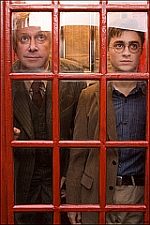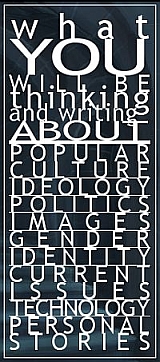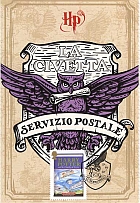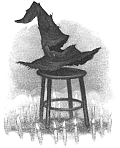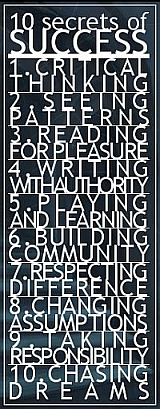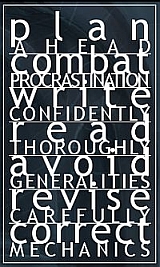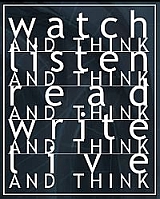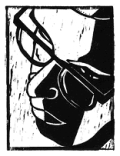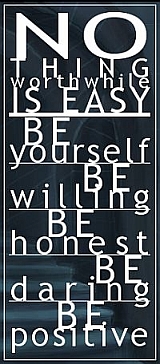|
ENGL 111i Download the PDF version of the course policies and syllabus.
"I always advise children who ask me for tips on being a writer to read as much as they possibly can. Jane Austen gave a young friend the same advice, so I’m in good company there."
"An idea that is not dangerous is unworthy of being called an idea at all." |
THE CENTRAL QUESTION FOR OUR CLASS IS: Can you think what Harry Potter shows us all? Much like gazing into the Mirror of Erised, what does reading, thinking about, and writing about J.K. Rowling’s famed series—both -- books and films -- offer us? What do we see, know, desire? Can we read Harry Potter as more than just-for-kids, more than just fantasy? Is it literature? Is it important? Might it give us a different kind of knowledge or a different kind of truth? A requirement for this class is a well-developed curiosity about the world, about the culture we live in, and about the cultural productions we imagine, produce, and consume. Lister and Wells, authors of “Seeing Beyond Belief,” argue for just this kind of curiosity, a methodology for unpacking cultural productions; they say, “Cultural Studies allows the analyst to attend to the many moments within the cycle of production, circulation and consumption of [a text] through which meanings accumulate, slip and shift” (459). They argue that our understandings of identities, meanings, and power, as well as the intersections of cultural and social locations like race, gender, class, nation, and sexuality, can be excavated through the analysis of the texts we create and consume. This class will spend the quarter reading, thinking, writing about Harry Potter and how and what these texts argue, reveal, narrate, hide, perpetuate, and complicate the world we live in.
What is English 111: Composition with Literature?Ursula K. Le Guin once wrote, “First sentences are doors to worlds.” In a manner of speaking, English 111 is the first sentence of your university experience. This class is a first step, a first look, and often a first in-depth exploration of literature, of academic writing about literature, of reading for writing, of scholarly research, and of rhetoric. The class takes as a basic assumption that writing is a skill and that, like any skill, it can be improved through guided practice. In this class, we will work to develop, challenge, and enhance the writing skills you already possess into the skills and intuitions necessary for academic and professional success. In a fundamental way, English 111 is a gateway class, a class that will set a critical and analytical standard and inform and influence and hopefully enrich your other courses.
English 111 promises a quarter of writing, reading, discussion, library research,
asking questions, more writing, revision, more reading, more discussion, critical thinking,
analysis, fun, and even more writing and revision. It is a writing class after all. We will
engage texts small and large, everyday and theoretical and pay close attention to the tactics
of writing and rhetorical devices the authors employ. This particular incarnation of 111
also promises a healthy inclusion of popular culture, everyday media, film, technology,
cultural studies, politics, everyday activism, and experiential learning. Through all of
these things, you will learn the principles behind academic arguments, claims, evidence, and
analysis; you will develop rubrics of proofreading, revision, workshopping, research, and MLA
citation; and you will learn how to apply these skills in your writing persuasively,
responsibly, thoughtfully, and stylistically. By the end of the quarter, the goal is that
you will be well versed in the English 111 course outcomes and be prepared to face the
writing and reading challenges you encounter with the confidence and competence of a
critical reader, writer, student, and citizen.
|
Alas, school is out at Hogwarts. This class was last taught in Spring 2008.
Required Course Texts & Materials
• Readings on e-reserve (access via MyUW or the library website). |
|
|
"Education is not the filling of a pail, but the lighting of a fire."
"To write is to write is to write is to write is to write is to write is
to write is to write."
"Through joy and through sorrow, I wrote. Through hunger and through thirst,
I wrote. Through good report and through ill report, I wrote. Through sunshine and
through moonshine, I wrote. What I wrote it is unnecessary to say."
"Thought flows in terms of stories—stories about events, stories about people, and stories about intentions and achievements. The best teachers are the best storytellers. We learn in the form of stories." --Frank Smith |
What does Computer Integrated Classroom (CIC) mean?As part of the English Department’s Computer Integrated Classroom (CIC) program, you will have access to technologies not available in the traditional classroom. Half of our class periods will be held in the LAN (local area network) lab in Mary Gates Hall, where every student will have access to a computer. In the CIC lab, you will be able to explore the Internet, online resources, the UW library system, you will be able to converse and discuss with your peers through electronic message boards and discussion groups, and you will participate in computer-assisted editing, reviewing, and workshopping. Of course, you will also be able to use the computers for writing, word-processing, and revision. With these opportunities come a few added requirements and responsibilities. First, you will need an active UW email account. You will be required to provide some of your written work in an electronic form, which may require conversions between your home computer and the LAN computers. You will also be required to familiarize yourself with basic computer use, navigating Windows and the net, and the applications used by the class. If you are inexperienced with computers, you may need to spend a few hours outside of class practicing these skills. Finally, you will be required to abide by the LAN classroom's rules, procedures, and etiquette and "netiquette." At the start of the quarter, you will receive a copy of the “ENGL111: Computer Integrated Classroom LAN Primer,” which outlines key terms, CIC procedures, and basic LAN use. The full CIC Online Student Guide is available online at: http://depts.washington.edu/engl/cic/sgonline/.
What are the course goals (Course Outcomes)?
1. To demonstrate an awareness of the strategies that writers use in different writing contexts.
2. To read, analyze, and synthesize complex texts and incorporate multiple kinds of evidence
purposefully in order to generate and support writing.
3. To produce complex, analytic, persuasive arguments that matter in academic contexts.
4. To develop flexible strategies for revising, editing, and proofreading writing. |
LAN Rules & Etiquette
1) These Mice Don't Eat: No food or drink.
"Make it new." |
|
|
Course Requirements
Final Portfolio:
Class Participation:
Do I Have to Come to Every Class? Come to class. If you miss a class, you miss explanations, clarifications, assignments and exercises, peer reviews, workshops, and the class as a learning community. You are expected to be in class on time. Class will start immediately at the appointed time. If you come in after I start class, even by only a few minutes, you are late and it will be noted. Chronic or conspicuous attendance problems will negatively affect your class participation grade. If you miss class, please let me know (via email), provide any pertinent documentation, get class notes and what you missed, and we will make any reasonable accommodations. If you miss a great deal of the quarter, you are recommended to take the course during a quarter in which you can more easily attend class. |
What do I need to get an ‘A’ in this class?Improving your writing requires working simultaneously on different skills in different ways. This course combines several different activities and exercises to teach, improve, and illuminate the reading, thinking, and writing process. It is the hope that the strategies, practices, and experiences you learn in this class will transfer to your other classes and other work. Your grade should not be the sole exigence or motivation for this class. Hopefully, you walk away from English 111 with something more. Find some pleasure and some edification and some knowledge from this class (or any class really) and success is usually not far behind. With that in mind, your grade will be a reflection of improvement, engagement, and effort. Your grade is made up of two parts: your writing portfolio and class participation. Portfolio (70%) In this course, you will complete two major assignment sequences, each of which is designed to help you fulfill the course outcomes. Each assignment sequence requires you to complete a variety of shorter assignments leading up to a major paper. These shorter assignments will each target one or more of the course outcomes at a time, help you practice these outcomes, and allow you to build toward a major paper at the end of each sequence. You will have a chance to revise significantly each of the major papers using feedback generated by me, peer review sessions, and writing conferences. Toward the end of the course, having completed the two sequences, you will be asked to compile and submit a portfolio of your work along with a portfolio cover letter. The portfolio will include the following: one of the two major papers, four to six of the shorter assignments, and a cover letter that explains how the selected portfolio demonstrates the four outcomes for the course. In addition, the portfolio will need to include all of the sequence-related work you were assigned in the course. A portfolio that does not include all the above will be considered incomplete. Participation (30%) A classroom is a community. Both classroom and community provide support, safety, shared resources, conversation, and interaction. All students are expected to come to class prepared with readings and work done and to engage in the discussion and activities. Moreover, working in groups is one vital skill that this course hopes to foster. Collaborative learning and collaborative teaching add interest and investment in any classroom. Peer reviews, workshopping assignments, and general group work will help you brainstorm, learn and teach concepts, analyze examples, and develop the basic skills required to constructively critique other students’ work. Participation forms a large component of your final grade and you are encouraged to ask questions, create conversation, and respect one another. Reading and commenting on the work of your peers, discussing ideas, and engaging with the classroom community are all important parts of this course. You can see why it is essential that you attend class and participate. For example, class discussion, readings presentations, conferences, and writing workshops cannot be made up. Missing class may seriously compromise your ability to do well in this class. Negative class participation can also hurt your grade. In addition, failure to turn in homework, incomplete assignments, or late papers will negatively impact your participation grade. Beyond the formal written assignments, you will participate in the class web log. Please bookmark the blog address, check the site regularly, and feel free to comment and post regularly. The class blog will be used for announcements, assignment reminders, updates to the syllabus, as well as questions, inquiries, provocations, and an extension of in-class discussion. Blog commenting and posting will be taken into account in evaluating class participation. See the class blog for details on blog etiquette and rules of engagement.
Finally, this course requires that you meet with me individually twice during the quarter to
discuss your papers and your progress. Conferences give you the opportunity to get individual
feedback and to express any concerns or questions or suggestions. Conferences are mandatory
and if missed will affect your class participation and must be made up.
|
"I don't pretend we have all the answers. But the questions are certainly worth thinking
about." |
|
|
"You can’t wait for inspiration. You have to go after it with a club."
Late Assignments All assignments must be done completely and turned in on time. Lateness will subtract from your overall class participation grade and work must be turned in by the next class meeting after the original due date. Note that I will not comment on late work. However, you still need to complete late work or you will receive a zero. If you miss class on the due date of a paper, you must notify me and make arrangements to get the paper to me as soon as possible. Unless previously arranged, I do not accept assignments via email. Furthermore, all work must be seen and checked in by my to be eligible for your portfolio! Remember that a paper has not been officially handed in until it is in my hands. Never turning anything in late is always the best policy. |
What do the assignments look like?All papers must be typed or produced on a word processor. Word processing is preferable because it makes the mechanics of revision -- rearranging, adding, and deleting -- easy. If you do not have your own computer with word processing capability, computer labs are available on campus, including our CIC lab, with a variety of software that is easy to learn. All documents should be saved in Microsoft Word format; if you do not have access to Word, then save your documents in RTF or Rich Text Format. All papers should be submitted with the following manuscript guidelines:
1) 1" margins top, bottom, left, and right on each page; Papers that do not follow these format guidelines will not be accepted. They will be returned unread to you. Papers will be regarded as late until they are resubmitted in the proper format. Again, late papers will negatively impact your class participation grade. Always make a backup copy of every paper you turn in, lest you be one of the unhappy people whose paper is eaten by the computer. You may even want to take the precaution of e-mailing your paper to yourself as an attachment at least a couple of times during the drafting process and certainly BEFORE you exit the document for the last time and leave the computer lab, your friend’s computer, or even your own computer. This way, even if you lose your disc or your paper gets mysteriously erased, you still have a copy in your e-mail files.
What is the rubric of evaluation?Grading in English 111 is reserved till the very end of the quarter for your Portfolio assignment. The focus of assessment will be on commenting, evaluating rhetorical success, steady progress and improvement over time, and most importantly, revision. It may be disconcerting not to get letter or number grades on each assignment, but the methodology and pedagogy of 111 is to your advantage. First, withholding grades encourages revision and discourages “I can live with that” attitudes. Second, the portfolio gives you choice over what you think represents your best work. Finally, you will be graded on finished, revised, polished work. Practice makes perfect, after all. Over the course of the quarter, assignments will receive feedback and comments that will identify what you are doing well and what still needs improvement. Consider the following evaluation rubric as signposts or a kind of legend to your progress:
• Outstanding (3.7-4.0): Offers a very highly proficient, even memorable demonstration
of the trait(s) associated with the course or assignment goal(s), including some
appropriate risk-taking and/or creativity. |
"I feel that by writing I am doing what is far more necessary than anything else."
"If one is lucky, a solitary fantasy can totally transform one million realities."
"The world I create in writing compensates for what the real world does not give me." |
|
|
Contact Ed
Office:
"If you're going to have a complicated story you must work to a map; otherwise you'll never
make a map of it afterwards."
"Tell the readers a story! Because without a story, you are merely using words to prove
you can string them together in logical sentences." |
Finding HelpMy office and office hours are listed at the front of the course policies. I am available during that time and by appointment to help you. I encourage you to come see early in the quarter even if it is just to talk about the class, about the assignments, or about school in general. I may ask you to meet with me when I think a conference would be useful. My office is located in the ground floor of Padelford Hall (northeast of the HUB), Room B-33. See http://www.washington.edu/home/maps/northcentral.html?pdl.
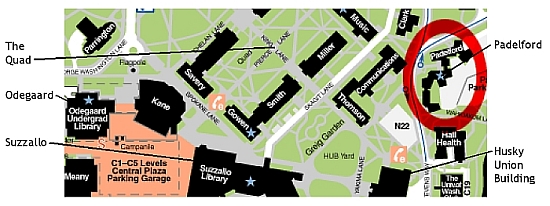
I am also available electronically by email and the course blog. Email and the blog are the best means of contacting me. I will do my best to answer your emails and blog posts, usually within twenty-four hours. If there is an emergency and you need to reach me, please contact the Undergraduate English office in A-2H&G Padelford. Furthermore, when time permits, I will supplement my office hours with virtual hours via AOL Instant Messenger (AIM nickname: EDagogy); if I am logged in, during reasonable hours, you are more than welcome to discuss the class or ask questions. Please, when you initiate an IM conversation for the first time, please identify yourself to me; also, be patient because my responses may not be immediate. You can find additional writing help at the English Department Writing Center (EWC) http://depts.washington.edu/wcenter/ located in B-12 Padelford Hall. Call (206) 685-2876 or email wcenter @ u.washington.edu with questions or to make an appointment. You must make an appointment to see a writing tutor. The Odegaard Writing and Research Center (OWRC) is a good resource for this class and other classes. OWRC is located on the third floor of Odegaard Library and offers a variety of services including help with papers, brainstorming ideas, help with reading, and research. See http://depts.washington.edu/owrc/ for more information. Moreover, the Center for Learning and Undergraduate Enrichment (CLUE) is also a good resource. CLUE is located in Mary Gates Hall Commons and offers tutorial sessions for most freshman lecture courses, skills courses, access to computer labs, and drop-in centers for math, science and writing. See http://depts.washington.edu/clue/ for more information.
Further resources, both on- and off-campus can be found on the Links page of the course website:
http://staff.washington.edu/changed/111/links.html.
|
"I entered the classroom with the conviction that it was crucial for me and every other
student to be an active participant, not a passive consumer...[a conception of] education as the
practice of freedom...education that connects the will to know with the will to become. Learning is
a place where paradise can be created."
"If one is lucky, a solitary fantasy can totally transform one million realities." |
|
|
"I like nonsense, it wakes up the brain cells. Fantasy is a necessary ingredient in living,
it's a way of looking at life through the wrong end of a telescope and that enables you to
laugh at life's realities." |
Academic DishonestyPlagiarism, or academic dishonesty, is presenting someone else's ideas or writing as your own. In your writing for this class, you are encouraged to refer to other people's thoughts and writing -- as long as you cite them. Many students do not have a clear understanding of what constitutes plagiarism, so feel free to ask questions about these matters at any time. Plagiarism includes:
• a student failing to cite sources of ideas If you have any doubt about how to cite or acknowledge another's writing, please talk to me. It is always better to be safe than sorry. As a matter of policy, any student found to have plagiarized any piece of writing in this class will be immediately reported to the College of Arts and Sciences for review. For further information, please refer to UW's Student Conduct Code at http://www.washington.edu/students/handbook/conduct.html. Play it smart, don't plagiarize!
Accommodations
If you have a registered disability that will require accommodation, please see me
immediately. If you have a disability and have not yet registered it with Disability
Resources for Students in 448 Schmitz Hall, you should do so immediately. Please
contact DRS at 206-543-8924 (Voice) or 206-543-8925 (V/TTY) or 206-616-8379 (FAX) or
via their website at
http://www.washington.edu/admin/ada/dss.htm.
I will gladly do my best to provide appropriate accommodation you require.
|
"We have to continually be jumping off cliffs and developing our wings on the way down." |
|
|
|
© 2007-08 Edmond Chang. All original material. All rights reserved. Email the webmaster of this site. These pages are best viewed with Mozilla Firefox or Internet Explorer. Open your browser to the largest viewable area. These pages are hosted by the University of Washington Computing & Communications system. |
|
